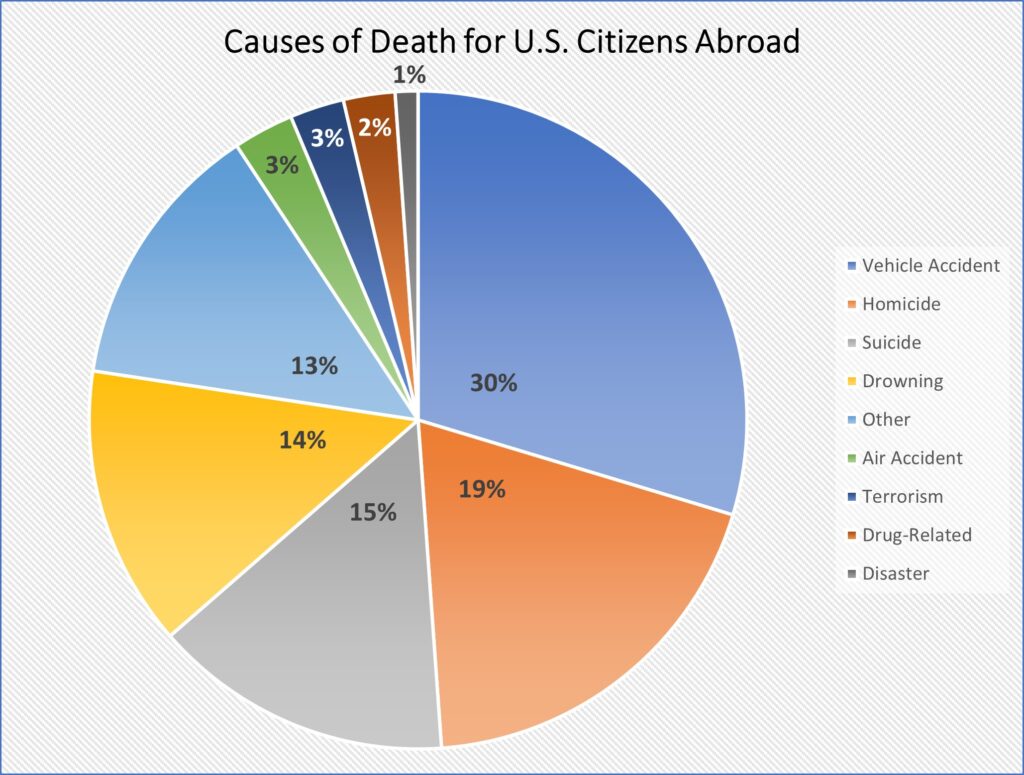
Traveling: Staying Safe on the Road
By TorchStone Senior Analyst, Ben West
While navigating traffic is one of the most routine activities for travelers, it is also one of the most dangerous.
Government records around the world highlight how traffic accidents are one of the leading causes of death for foreign travelers and locals alike.
Varying traffic laws, safety standards, driving cultures, and criminal threats pose substantial risks to the most confident drivers when they’re abroad.
While rideshare and taxi services are acceptable alternatives in many countries, dedicated driving services—and in some cases armored vehicles—are preferable in higher-threat countries.
Traffic Safety
Traffic accidents are the leading cause of deaths of American Citizens abroad according to State Department figures from 2002-2022.
Vehicle accidents, including buses, cars, motorbikes, and pedestrians struck by vehicles, accounted for 4,399 (30%) of the 15,237 deaths recorded over the past 20 years.
While the State Department does not provide figures on life-changing injuries, property damage, and financial losses caused by vehicle accidents, it is likely that if those figures were available, they would show a significant increase in the number of people impacted by vehicle accidents.

It’s obviously not just U.S. Citizens who are affected by traffic accidents.
The World Health Organization estimates there are 1.3 million deaths per year due to traffic accidents and that 93% of fatalities occur in low and middle-income countries.
Poor road conditions, lax traffic regulations, poor vehicle maintenance, and inadequate medical care compound the risks associated with traffic accidents in those countries.
And traffic safety isn’t only a concern abroad.
In the United States, traffic accidents are the leading cause of death for people under the age of 55.
Laws and the Court System
Virtually every trip, whether it be for business or leisure, is going to require some element of driving, meaning that every traveler needs to take road safety into account.
Before traveling, it’s a good idea to review general traffic safety trends.
In many countries, the risks are low, such as Australia, where the traffic fatality rate is only 5.6 per 100,000 people and there are strict traffic laws regulating everything from speed to anti-lock braking systems.

World Health Organization Map of the World by Traffic Fatality Rates (2018)
On the other hand, the Dominican Republic has a traffic fatality rate over six times higher than Australia’s at 34.6 per 100,000.
Loosely enforced traffic laws and virtually no vehicle safety standards contribute to the higher risk in the Dominican Republic.
In some countries, renting a car and driving yourself may seem the most convenient way to go, but driving varies significantly around the world, and getting on the road in an unfamiliar environment (even if it is relatively safe) can greatly increase the risk.
There is also liability to consider.
If you are liable for an accident that caused bodily harm or damaged property, you are at the mercy of a foreign justice system that, in the best-case scenario, could seriously disrupt your trip and in a worst-case scenario, result in stiff penalties.
In 2019, the spouse of a US diplomat struck and killed a 19-year-old boy while she was driving on the wrong side of the road in the UK.
While she was able to claim diplomatic immunity and flee the United Kingdom shortly after the accident, she still faces charges in the UK and the incident has hurt perceptions of the U.S. in the UK.
The potential costs of traffic accidents abroad can quickly outweigh any savings from driving yourself.
Rideshare services and taxis are a slightly better choice in most developed countries, especially where traffic regulations require some level of driver certification and basic vehicle safety measures.
But ultimately, you can never really know who is behind the wheel and how much training they have—or how long they have been on shift.
Many countries don’t have labor laws requiring breaks, meaning drivers work dangerously long hours.
Unregulated taxi services, sometimes called pirate or gypsy cabs, which are typically distinguishable by their aggressive marketing approaches, are notorious for scamming passengers and even setting them up for criminal attacks.
International airports and tourist centers tend to attract taxi scams, charging passengers exorbitant amounts or, in a recent example from Santiago, Chile, stealing travelers’ credit card information.
The safest option, regardless of where your travels take you, is to hire a trusted driver and/or driving service to handle all your ground transportation needs.
Vetted driving services will ensure you are with a well-trained and prepared driver operating a well-maintained vehicle that meets or exceeds local safety standards.
Well-trained local drivers will be aware of the localized threats and know which areas to avoid to keep passengers safe.
Often a reputable driving service can be recommended or even arranged through your hotel.
Criminal Threats
In some extreme cases, you may need a driver specially trained in taking evasive action and an armored vehicle due to the criminal threat in the area—or based on the threat profile of the travelers.
In such cases, hiring a dedicated driver through a vetted service is imperative.
A series of attacks outside the Interlagos Formula 1 circuit in Sao Paulo, Brazil illustrates the advantages of using well-trained drivers and armored vehicles in dangerous situations.
In three attempted attacks over the course of seven years, police-trained drivers operating armored vehicles were able to evade gunmen targeting Formula 1 team members on two of the occasions.
However, in a third incident, in nearly the identical spot as the other two, eight gunmen forced their way into an unarmored van carrying Mercedes team members stealing cash and other valuables from the passengers.
Ultimately, before you travel, it’s wise to inform yourself of all the threats you may face there—including crime, terrorism, and natural disasters.
But statistically, you are most likely to be impacted by traffic accidents, so be sure to include threats associated with ground transportation to any security plan.
Below are some initial questions to provide guidance on the level of ground transportation services you’ll need on your next trip:
- Does the country have and enforce basic traffic safety laws? Are drivers required to undergo any kind of test or can anyone get behind the wheel? Are cars required to have seatbelts and undergo regular safety inspections?
- Are roads well maintained? Are they lit at night and have reflective lane markers? Are hazards and turns well-marked?
- Does the country recognize foreign insurance policies? Is its legal system fair to foreign citizens?
- What is the criminal threat in the country? Do criminals often target foreigners? Do they often target vehicles?
- In a worst-case scenario of an accident, are medical services able to respond quickly and effectively to a roadside emergency?
